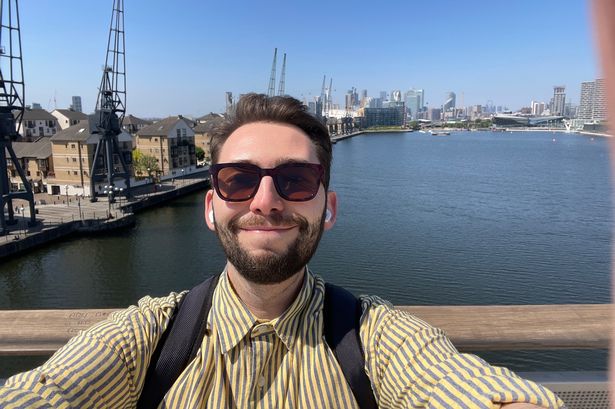Health
Man’s Persistent Tonsillitis Leads to Life-Saving Cancer Diagnosis

A 32-year-old man from London, Pawel Chmura, discovered a hidden tumour under his tongue following repeated bouts of tonsillitis. His experience highlights the critical importance of listening to one’s intuition regarding health concerns.
Chmura, who works as a front-of-house coordinator for a marketing agency, began investigating his recurring tonsillitis at the end of 2023. “It all started from something entirely different. The year before I was diagnosed with mouth cancer, I was having issues with my tonsils,” he shared. Upon returning from holidays, he repeatedly suffered from tonsillitis, prompting him to seek answers after numerous rounds of antibiotics proved ineffective.
After initial tests and swabs at his general practitioner yielded no results, Chmura pushed for further examination. He utilized his health insurance with Bupa to consult specialists. In early 2024, he was referred to an infectious disease expert who identified a suspicious anomaly on an MRI scan. “When I had a call to discuss the results, the specialist said, ‘your tonsils are fine, but we found something on the image which I think you need to speak with someone else about,’” Chmura recalled.
Despite the initial reassurance, Chmura faced anxiety regarding the next steps. A subsequent investigation, including an ultrasound and a fine needle biopsy, was complicated by the lump’s location under his tongue. As his apprehension grew, he found a specialized surgeon through Bupa who would ultimately remove the lump for further analysis.
Two weeks later, during a follow-up appointment, Chmura received the devastating news. “When I walked in and saw the doctor and nurse, I felt like something was off straight away. We sat down and they said, ‘listen, unfortunately, it’s cancer.’”
According to the Oral Health Foundation, mouth cancer is among the UK’s fastest-growing cancers, with cases increasing by 38% in the past decade. After his diagnosis, Chmura felt a sense of relief due to the clarity of his treatment plan, although he struggled with how to inform his parents in Poland.
“The only thing I focused on was how to tell my parents and how to organise them to fly over here from Poland,” he stated. He emphasized the difficulty of delivering such news, particularly to his parents, who were understandably devastated. Chmura reassured them about the quality of his care, encouraging them to remain hopeful.
Dr. Raf Niziol, an oral and maxillofacial surgeon, led Chmura’s treatment. The surgery entailed removing the floor of the mouth, conducting a neck resection, and performing a forearm tissue transplant. A tracheostomy was also necessary to help manage post-operative swelling. Chmura described his recovery as a “blur,” influenced by painkillers.
“It’s very weird going back to the time when I was in ICU, because I was on so many painkillers that everything feels like a blur,” he explained. Nevertheless, specific moments remained vivid, such as the troubling nights post-surgery when he battled nightmares and discomfort. To find solace, he turned to music, playing the radio on the hospital TV.
Chmura returned to work three months after the operation, yet he continues to grapple with the fear of recurrence. “The type of cancer means that I need to have yearly test scans and in this particular case, there is quite a high chance of recurrence in the lungs,” he noted. Although he strives to stay positive, the thought of potential relapse is ever-present.
Additionally, Chmura had to relearn how to use his tongue following the extensive surgery. “My tongue doesn’t feel as flexible as it once was, and I can no longer stick it out,” he remarked.
Neil Sikka, director of dentistry at Bupa Dental Care, highlighted the crucial role dental professionals play in detecting oral abnormalities. “During routine check-ups, we perform a cancer screening examination and are well-placed to spot early signs of mouth cancer and refer patients for further investigation when needed,” he stated.
Reflecting on the challenges of 2024, Chmura expressed a newfound determination to embrace life fully. “I’ve named 2025 as the year of making dreams come true,” he declared. He has focused on travel and experiences, including attending a Lady Gaga concert in Barcelona. “I want to try and get as much out of life as I can, because I could have possibly been dead at 30 if the surgery went wrong,” he said.
Chmura’s experience serves as a reminder of the importance of advocating for one’s health. “If there is a worry about anything, just go and have it checked, because if I didn’t push, god knows when we would have found it,” he urged.
-

 Entertainment3 months ago
Entertainment3 months agoAnn Ming Reflects on ITV’s ‘I Fought the Law’ Drama
-

 Entertainment4 months ago
Entertainment4 months agoKate Garraway Sells £2 Million Home Amid Financial Struggles
-

 Health3 months ago
Health3 months agoKatie Price Faces New Health Concerns After Cancer Symptoms Resurface
-

 Entertainment3 months ago
Entertainment3 months agoCoronation Street’s Carl Webster Faces Trouble with New Affairs
-

 Entertainment3 months ago
Entertainment3 months agoWhere is Tinder Swindler Simon Leviev? Latest Updates Revealed
-

 Entertainment4 months ago
Entertainment4 months agoMarkiplier Addresses AI Controversy During Livestream Response
-

 Science1 month ago
Science1 month agoBrian Cox Addresses Claims of Alien Probe in 3I/ATLAS Discovery
-

 Health4 months ago
Health4 months agoCarol Vorderman Reflects on Health Scare and Family Support
-

 Entertainment4 months ago
Entertainment4 months agoKim Cattrall Posts Cryptic Message After HBO’s Sequel Cancellation
-

 World2 weeks ago
World2 weeks agoBailey Announces Heartbreaking Split from Rebecca After Reunion
-

 Entertainment3 months ago
Entertainment3 months agoOlivia Attwood Opens Up About Fallout with Former Best Friend
-

 Entertainment1 week ago
Entertainment1 week agoCoronation Street Fans React as Todd Faces Heartbreaking Choice





















